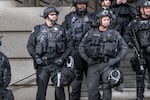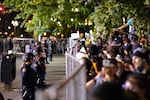When Portland police Officer Corey Budworth was indicted by a Multnomah County grand jury in June for assaulting a woman during a protest last summer, it was the last straw for his teammates on the bureau’s Rapid Response Team.
The team had spent the previous year leading the police bureau’s response to an unprecedented, sustained protest movement directed primarily against the bureau’s own history of excessive force and racist policing.
The mass resignations from the Rapid Response Team raise a raft of questions about how the police bureau will manage officer morale and discipline in the ranks, carry out effective police oversight, and address staffing shortages while officers say it is their rudderless and politicized leadership team that is the problem. And for the city of Portland, there has yet to be a clear vision of what a changed Portland Police Bureau might look like over the long term.

In this February 2020 photo supplied by a protest observer, Portland police Officer Corey Budworth, left, and Det. Erik Kammerer, right, are suited up in front of the Multnomah County Justice Center. The Oregon Department of Justice is reviewing Det. Kammerer’s actions for possible criminal charges related to use of force at last summer’s racial justice protests. Officer Corey Budworth has been indicted by a grand jury for fourth-degree assault for his alleged excessive force during an Aug. 18 protest.
Courtesy of Doug Brown
“There’s a lot of confusion within the organization as to what we stand for. And that’s a huge deal,” said a Portland police officer who wished to remain anonymous for fear of retaliation. “We are supposed to represent something, and we have a command structure above us that a lot of us don’t trust anymore because of the last year.”
That officer said there are tensions playing out in the bureau between an old guard, who take an “us vs. them” view of policing and tend to be more aggressive, and officers who shy away from those extremes while strongly favoring community policing. But, the officer said, as leadership has tried to bring cultural change at the bureau, the lack of trust from below has stymied that effort.
After last summer’s massive uprisings, as nightly crowds in the thousands dwindled to crowds in the low hundreds, this officer said they and their colleagues experienced cognitive dissonance as leadership constantly reminded them that the officers’ most important job was to protect the community — while at the same time, from the street officers’ perspective, preventing them from protecting the community.
“We let it happen and happen. We let officers get injured and injured. And why?” the officer asked. “Because nobody wanted somebody on a phone camera to be on snapchat for a minute saying something bad about PPB.”
Bad leadership, bad morale
Rapid Response Team Commander Lt. Jacob Clark said morale on his team remained high throughout last year’s protests, despite a grueling work pace and frequent injuries. The memo Clark wrote summarizing the team’s reasons for resigning indicated a wide range of grievances that have been building over time. It also explicitly called out poor bureau and city leadership.
“The lack of clear guidance has led the team to lose confidence in their decision-making, and fearful of later repercussions which they are currently experiencing in the form of delayed internal investigations,” the memo reads.
Clark said the way team members were trained to handle protests was known and approved by bureau leadership, and officers were policing protests according to that training. Now, he said, it seems like the rules are being rewritten after the fact.
“After the fact, they’re finding out that changes in legal interpretations, policy interpretations — all those things — are looked back at retroactively and they’re saying, ‘No, that’s in fact wrong even though you thought you were doing everything right.’ And, ‘here’s your discipline,’” Clark said.
The team’s resignations came a day after the public learned of Budworth’s indictment and that another officer, Det. Erik Kammerer, was being investigated by the state Department of Justice for use of force violations during protests. Internally, investigations into use of force have been ongoing for months and are said to involve numerous members of the Rapid Response Team.
For RRT officers, it’s those ongoing investigations that are impacting their morale, not the months of protest response, according to Clark.
“It didn’t really start happening until this year,” he said about the drop in the Rapid Response Team’s morale. “It really started as all these investigations started reaching the finding stages, and a lot of them are still getting called in for internal affairs interviews for incidents that happened last summer. So, yeah, it did start to deteriorate.”

Protesters face police officers along a fence in downtown Portland on June 2, 2020.
Jonathan Levinson / OPB
It’s those very investigations that outside observers say the bureau should have been doing all along.
Budworth was caught on film hitting a protester with his baton from behind in the head and neck as she was walking away with her hands over her head. After knocking her down, he hit her again as she was sitting up.
The bureau reviewed officer Budworth’s use of force report stating the head strike was accidental and did not investigate it further. But federal prosecutors overseeing the DOJ settlement agreement said that decision contravened bureau directives requiring a full investigation for any potentially deadly use of force, such as a head strike with a baton.
“This particular incident was clearly out of policy and also potentially criminal,” said Elliott Young, co-chair of the Portland Committee on Community Engaged Policing. “It suggests a massive disconnect between how the internal discipline system works and what the rest of the world views as criminal behavior by the police.”
The investigations cap a year during which the bureau reported more than 6,000 use of force incidents against protesters and almost nightly videos posted online showing officers beating protesters with their fists, batons, and shooting nonviolent demonstrators with impact munitions.
Bad morale, bad discipline
The deterioration in morale at the bureau has corresponded to some remarkable breakdowns in discipline. While officers have decried politicized leadership, they themselves have stepped into the political fray, targeting leaders they view as hostile to police. It’s a notable departure from typically rigorous institutional discipline.
As officers grew more frustrated by their belief that Multnomah County District Attorney Mike Schmidt wasn’t prosecuting enough protesters, they turned their ire on him. A screenshot of a Portland Police Bureau computer showing Schmidt’s home address was sent to a conservative news outlet, doxxing him and his family. Schmidt said they had to leave their home for fear they’d be targeted.
At a meeting with Portland police officers early in his tenure, one officer allegedly told Schmidt they didn’t trust him because he’s antifa. Daryl Turner, the president of the union representing rank and file officers, accused Schmidt of being backed by George Soros.
Perception of whether or not Schmidt has been tough enough on protesters has been a frequent talking point in some media outlets fond of attacking the DA as being a progressive who is weak on crime. Data show most cases originating from the protests are low level offenses, however. The Portland Police Bureau has referred 1,108 protest related cases to the DA for prosecution between May 29, 2020 and June 18, 2021. One thousand of those were public order violations, minor offenses like interfering with a peace officer or disorderly conduct. The DA has brought charges in 195 cases and chosen not to prosecute 704 cases, or 64% of the total referred to his office. Another 169 cases were rejected because the police didn’t have sufficient evidence, or because the DA requested additional investigation from officers.
Despite statistics showing Schmidt was prosecuting the most serious crimes emerging from protests, officers continued to target him.

Multnomah County District Attorney Mike Schmidt
Courtesy Mike Schmidt
Speaking in uniform to the Lents Neighborhood Livability Association in January, East Precinct Commander Erica Hurley potentially violated bureau directives when she told residents if they want more done about people camping on the street, drug use or crime in general, they need to vote Schmidt out of office.
“When the vote comes up again — because, the reality is, he won the vote with over 70% of the people — you have to vote ‘no,’ right?” Hurley said.
The 26-year-veteran of the bureau went on to make false claims about the size of budget cuts and officer reductions passed in the wake of last summer’s protests.
In March, someone inside the bureau leaked false information tying City Commissioner Jo Ann Hardesty — a frequent police bureau critic — to a hit-and-run. Hardesty was quickly cleared when the rumor proved untrue. Days later, then-Portland Police Association President Bryan Hunzeker resigned from his position in the union citing a “serious, and isolated mistake relating to the Police Bureau’s investigation into the alleged hit-and-run by Commissioner Hardesty.”
Hunzeker has been on administrative leave from the bureau since the end of May for what the police bureau said is a confidential personnel matter.
Things will be different
Underlying all of this — the massive protests, the violent police response, leadership struggling to navigate demands for change, and the ensuing officer backlash — is a nationwide failure to hold police accountable for abuses of power and excessive use of force that regularly shocks the public’s conscience.
In Portland, a proposed remedy to that failure is the independent oversight board approved by voters last November which, when finally implemented, will have broad authority to review use of force cases, discipline, and even terminate officers.
The plan has been fiercely opposed by the police union, which has insisted the oversight board is subject to collective bargaining requirements, a claim that was significantly weakened when the state Legislature passed a narrowly-worded law allowing voter approved police oversight boards to take effect without negotiating with the union.
“If we are to move forward, police officers themselves need to be supportive of holding themselves and their fellow officers accountable,” Young said, adding that the Rapid Response Team resignations suggest a resistance to accountability among rank-and-file officers. “The bigger issue, ultimately, is the culture within the Portland Police Bureau.”

Portland Mayor Ted Wheeler speaks at a press conference in Portland, Ore., Friday, March 20, 2020.
Bradley W. Parks / OPB
Portland Mayor Ted Wheeler, who is facing a recall effort in part for not being tougher on police, agreed this week that police culture needs to change in Portland.
“Things are going to be different in the future with regard to policing here in Portland and all across the nation,” Wheeler said during a press conference Tuesday. “There’s going to be bumps along the road but that’s the future.”
Wheeler said a transparent and accountable bureau is not mutually exclusive from a bureau that is adequately staffed and has the tools and resources they need.
The oversight board is, at a minimum, 18 months from becoming a reality. The charter amendment required a commission to spend 18 months sorting out the specifics of how the board will work. That commission has yet to be formed.
Does Portland need more officers?
Meanwhile, Wheeler’s promise for an adequately staffed bureau is moving further out of reach. The bureau is once again hiring to replace people it has lost this past year and hoping to shore up what it describes as a staffing crisis.
The bureau currently has 809 total sworn officers out of an allotted 916. That’s after budget cuts in 2020 forced the city to reduce the total allotted positions from just over 1,000.
Last year also saw 55 officers retire and 29 separate from the bureau, meaning they either quit policing or transferred to a different department. The previous year saw 45 retirements and 33 separations. So, while last year was aberrant in so many ways, police officers leaving the bureau wasn’t one of them.
Cpt. Anthony Passadore, who runs the bureau’s personnel division, said they hope to hire 50 new officers by the end of the year. The bureau also plans to hire more soon after, but that’s barely enough to make up for the 84 officers who left or retired in 2020, and far short of the additional 85 officers eligible to retire in July 2022 when pension calculations will make retirement particularly appealing.
The nature of the departures concerns Passadore, too.
“Usually you would see them go to like Arizona or California, or they were in the process of moving for some reason,” Passadore said. “We haven’t historically seen the number of police officers leaving Portland Police Bureau to go work at other agencies within the metropolitan area.”
A hiring freeze related to budget cuts also stalled efforts to replace those officers who were leaving.
“We were having an amazing success in hiring over the last two years,” Passadore said. “Our hiring numbers had increased, our diversity in applicants, and our diversity in actual hires had reached an all time high. We were really on a great pace.”
In May, eight new officers were hired, the first since last June.
Shootings and homicides have continued a dramatic increase in 2021, prompting some to say more police are the answer. But after a year of uprisings demanding fewer police in the community, the prospect of growing the ranks is anathema to everything thousands of people were fighting for last year.
If the goal is to reduce violent crime, then research suggests that more officers on the streets could be part of the solution, but with some caveats.
“More or less the question was, ‘Do police save white lives and Black lives?’” said University of Oregon professor Benjamin Hansen, who co-authored a study looking at how the size of a police force impacts the rates of homicides, crime reporting and arrests for communities broken down by race.
“When there’s more police in the community, there is a decrease in both Black homicides and white homicides,” Hansen said. “The effects per capita are even larger for Black civilians than for white civilians.”
Hansen said their research suggests more police in a community is associated with a reduction in the most severe crime in both white and Black communities. Specifically, for every additional 15-20 officers, one homicide is prevented.
But the research also found when there are more officers, there’s an increase in low level arrests, too, things like public consumption of alcohol and drug possession. Those arrests disproportionately impact the Black community.
Hansen said their study showed pursuing low level arrests did not reduce homicide rates or other serious crime.
“In the cities where the Black populations were the largest, there were the smallest safety gains but there were the largest increases in low level arrests,” Hansen said. “So that would go against the idea that broken windows policing is the answer here.”
Police don’t just prevent violence, however, they also perpetrate it, Hansen said. For every additional 10-20 low level arrests, researchers found about one use of force incident.
“These are hard things to quantify because we’re talking about the benefits of police, which is preventing a violent crime, versus government sanctioned violence, which is use of force,” he said.
The study didn’t explore the social costs of policing, a limitation Hansen acknowledged. But he pointed to mountains of research showing investments in drug rehabilitation and mental health are massively effective at reducing violent crime. In terms of police, Hansen said the best answer may be to hire more officers and have them do little more than be a presence in the community.
That would require a substantial cultural shift that, so far, police have been reluctant to embrace.
